Fenway Health advocates for and delivers innovative, equitable, accessible health care, supportive services, and transformative research and education. We center LGBTQIA+ people, BIPOC individuals, and other underserved communities to enable our local, national, and global neighbors to flourish.
Healthcare is a Right, Not a Privilege.
1971
Motivated by the belief that healthcare is a right, not a privilege, politically active area residents and politicians open a one-day-a-week drop-in center in the basement of a building owned by the Christian Science Church. The center is staffed by volunteer medical students dedicated to serving the diverse Fenway neighborhood—a neighborhood that includes many seniors, gays, low-income residents, and students. Reflecting this mission, the founders name the center Fenway Community Health Center.
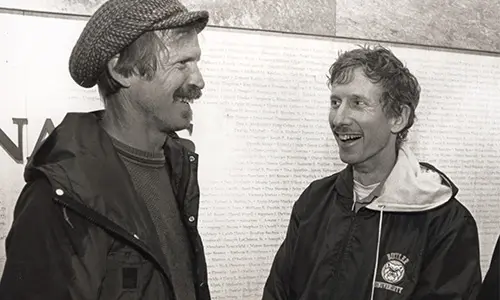
Two of Fenway’s original founders.
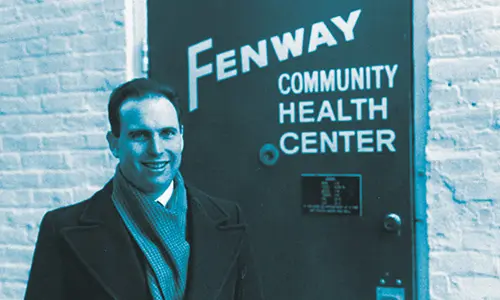
Board of Directors Chairperson Stewart Landers stands in front of Fenway’s original entrance on Haviland Street.
1973
To accommodate an increase in demand for services, the Center moves into a larger space in the basement of 16 Haviland Street.
Fenway incorporates as a freestanding health center and elects a volunteer governing board.
Three separate collectives take root at Fenway Community Health Center: Women’s Collective, Gay Men’s Collective, & Elders’ Collective.
Cost of a patient visit:
Or,
"Whatever you can pay."
1975
Patient Visit Total:
Number of Employees:
1976
Fenway Community Health Center conducts anonymous STD testing at gay bathhouses in Boston as part of a joint effort with the Department of Public Health to reduce the spread of STDs and hepatitis.
First paid medical director hired.
1978
Fenway Community Health Center applies to become fully licensed by the Massachusetts Department of Public Health.
1980
Health care providers in New York and San Francisco begin observing a pattern of cancer-like symptoms among gay men. The National Center for Disease Control names the syndrome Gay Related Immune Deficiency (GRID).
Fenway opens a laboratory on site.
Volunteering his time, Dr. Ken Mayer initiates the Center’s earliest infectious disease research.
The New England Conservatory becomes the first area college to contract Fenway’s mental health services for their students.
Fenway introduces mental health services as a satellite site for Mass Mental Health.
Operating Budget:
Patient Visit Total:
1981
Fenway makes the first diagnosis of AIDS in New England.
1982
Fenway’s Board of Directors creates an ad hoc committee charged with developing a series of AIDS Forums to address the medical and psychosocial implications of AIDS. The committee later evolves into the independent Boston AIDS Action Committee.
1983
- Fenway pioneers the first home-based Alternative Insemination (AI) program in the nation.
- Fenway launches AIDS hotline.
- First Fenway AIDS outreach conducted at Boston’s annual Gay Pride celebration.
1984
Fenway opens anonymous HIV testing program.
Collaborating with Harvard Medical School, Fenway becomes one of the first medical facilities in the US to culture HIV from blood and semen samples. This project marks the beginning of a long-term collaborative relationship with both the medical school and Harvard’s School of Public Health.
Fenway’s Dr. Ken Mayer begins searching for antibodies to HIV.
1985

Cambridge Women’s Health Collaborative becomes part of Fenway Community Health Center.
Massachusetts bans gays and lesbians from becoming foster parents.
First baby is born from the Alternative Insemination program.
1986
The AIDS Action Committee incorporates as an autonomous nonprofit agency.
Mission statement revised to reflect Fenway’s commitment to the gay and lesbian community.
Operating Budget:
Patient Visit Total:
The first AIDS Walk Boston, then known as “From All Walks of Life”, was held on Sunday, June 1, 1986 in response to the growing need for support and public awareness in the fight against AIDS. Launched by AIDS Action Committee, that first walk brought together 4,000 people and raised close to $350,000. Since that time, more than 350,000 people have participated in AIDS Walk Boston, raising over $40 million in support of HIV/AIDS treatment, prevention, and awareness programs and services here in New England.
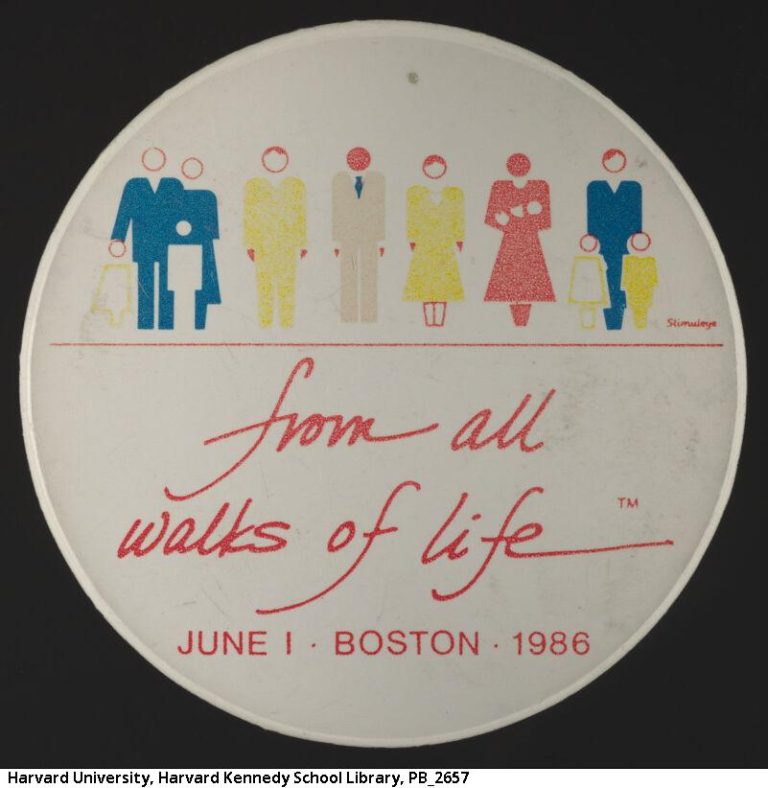
1987
Second full-time physician hired.
1988
Fenway is the first medical facility in the state to offer the experimental HIV treatment Aerosol Pentamidine, prior to its approval by the Food and Drug Administration.
First full-time nurse hired.
1989
Living Well series initiated to educate community about the prevention and treatment of HIV/AIDS.
Fenway’s Victim Recovery Project, later known as the Violence Recovery Program (VRP), established. Data collected from the program plays a significant role in efforts to pass the statewide Gay Rights Law and Hate Crimes Statistics Act.
Alternative Insemination program advocates within medical community for broader access to insemination services for single women and lesbians.
Fenway initiates its first Lesbian Health Task Force and first Lesbian Health Day.
Fenway’s Substance Abuse Counseling Program formed.
Gay and Lesbian Helpline established at Fenway.
Holistic health services instituted at Fenway. Fenway becomes one of the first medical facilities in the state to utilize acupuncture as a pain management treatment for people with HIV.
Upon completion, Fenway’s garden is dedicated as Goosebump Park—a reference to the one-woman show “Search for Signs of Intelligent Life in the Universe”—in honor of Lily Tomlin’s and Jane Wagner’s continued support.
Fenway recognized in The Boston Globe Magazine for organizing the Community Research Initiative (CRI), which will later become an independent agency.
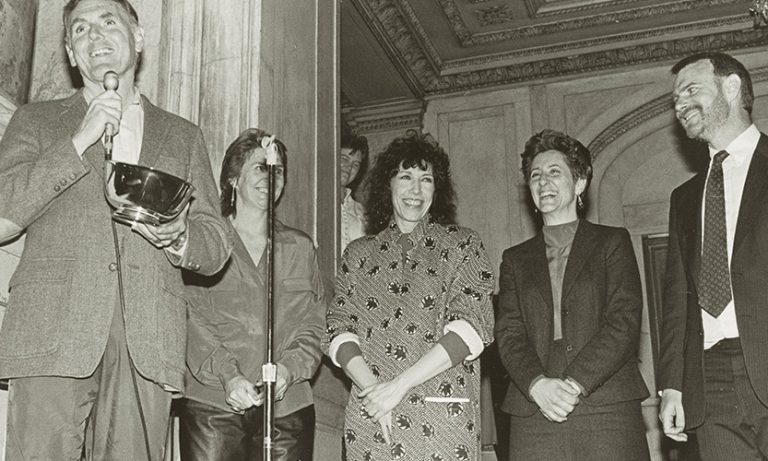
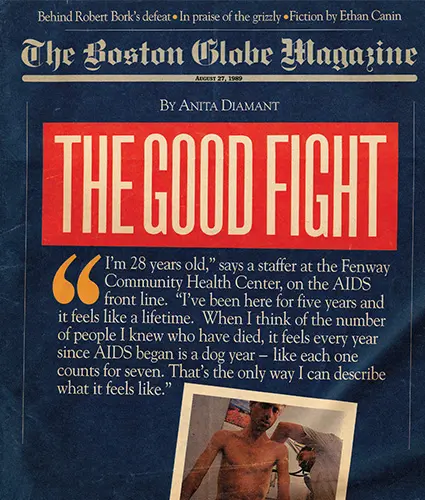
Left: Boston Mayor Ray Flynn honors Lily Tomlin at a Wang Center reception after her benefit performance nets more than $63,000 for local organizations,including Fenway’s Capital Campaign & Building Fund. Pictured are Mayor Flynn, Ann Sanders, Mayor Flynn’s liaison to the gay community, Lily Tomlin, and Fenway Executive Director, Dale Orlando.
1991
- Fenway’s anonymous testing program performs 40% of all anonymous HIV tests in the state.
- After completing a successful $4 million building campaign, Fenway moves out of the basement at 16 Haviland Street into a new state-of-the-art facility at 7 Haviland Street.
- Fenway’s HIV caseload reaches 500, second in the state only to then Boston City Hospital.
Opening New Doors
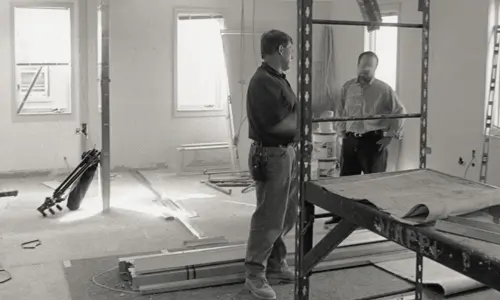
Interior construction at 7 Haviland Street.
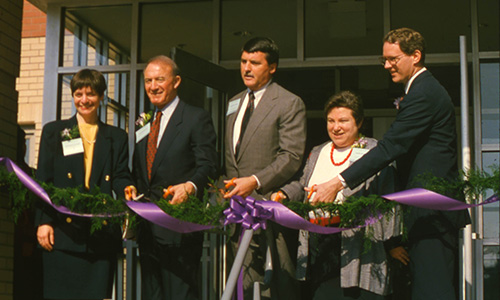
The ribbon cutting ceremony to dedicate the health center at 7 Haviland.
1992

On April 11, 1992, 550 people dressed in their best packed the halls of the Boston Ballet. Their mission? To raise money for Fenway Health, to bring renewed attention to women’s health, and to throw a fabulous celebration of Boston’s vibrant LGBT community. The Fenway Health Dinner Party was born.
The Dinner Party’s name is a tribute Judy Chicago’s pioneering art installation. Chicago’s The Dinner Party is considered an iconic work of feminist art, depicting a large with place settings laid for famous women throughout history. In this spirit, The Fenway Health Dinner Party continues to uplift LBTQ women and honor their many contributions to health care for all.
1st Dinner Party
Date: 4/11/1992
Location: Boston Ballet
Chair: Deborah Heller
Awardee: Susan M. Love, MD
1993
Fenway’s Color Me Healthy program initiated to provide HIV education and outreach to men of color.
Lesbian Health Research Subcommittee formed.
Fenway Forums established to train credentialed mental health professionals how to identify and respond to gay, lesbian, and HIV/AIDS health issues.
Alternative Insemination program makes office-based services available to clients.
Lesbian Health Series launches, providing outreach and education to lesbians at high risk of developing breast cancer.
The National Institute of Allergy and Infectious Diseases selects Fenway as one of eight sites – and the only community-based health center – to recruit patients for the nation’s first HIV vaccine trials.
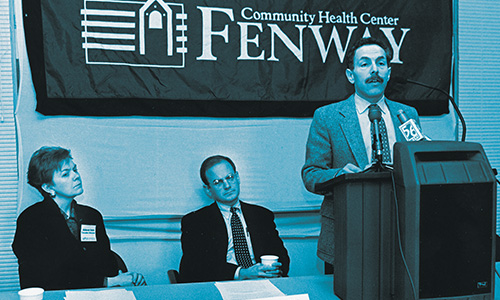
Medical Research Director Dr. Ken Mayer announces Fenway’s distinction as one of eight national sites chosen to conduct HIV vaccine trials. Also pictured are Executive Director Deborah Ruhe and Medical Director Dr. Stephen Boswell.
1994

On February 19, 1994, Boston’s Winter Garden was filled with hundreds of sharply dressed partygoers. The crowd was there for more than a good time, however – attendees had come out to raise money for Fenway Health at the first ever Fenway Men’s Event.
This yearly celebration of philanthropy and community soon became one of the hottest nights out for Boston’s LGBT community and its allies. A quarter of a century later, thousands gather each year to dine, dance, and support the lifesaving mission of Fenway Health.
1st Men’s Event
Date: 2/19/1994
Location: Winter Garden
Co-Chairs: Manny Berger, Michael O’Hagan
Awardees: Randy Price (local), Rod & Bob Jackson-Paris (national)
1995
Riders embark on the first Boston to New York AIDSRide, kicking off the largest single AIDS fundraiser in the country.
Boston Conservatory of Music contracts with Fenway to provide primary health care services for its students and employees.
Fenway initiates at-home care program for neighborhood seniors.
FDA fast-tracks availability of protease inhibitors for the treatment of HIV/AIDS.
Operating Budget:
Patient Visit Total:
HIV Related Visits:
1996
Fenway celebrates 25 years of operation.
Viral load testing offered as a new HIV/AIDS treatment service at Fenway.
Fenway institutes the use of acupuncture as a viable practice in the treatment of substance abuse.
Fenway patients who receive free care become automatically eligible for free care from Beth Israel.
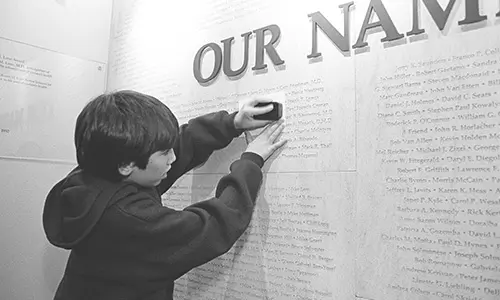
Josh Levinger, the first child born through Fenway’s AI program, makes a rubbing of his name from the “Our Names Wall” during Fenway’s 25th anniversary dedication. (Photo: Marilyn Humphries)
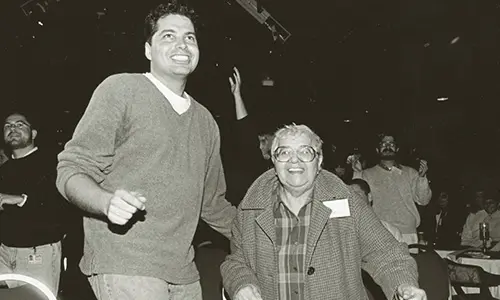
Fenway staff member John Lowe celebrates with one of Fenway’s senior patients at the 25th anniversary celebration.
1997
Fenway increases number of holistic medical providers on staff.
1998
The Russell-Harris medical practice, located in the Back Bay/South End, merges with Fenway Community Health.
Fenway produces first Lesbian and Bisexual Women’s Health Research Forum in New England.
Fenway provides more than 800 free hepatitis vaccinations to the community.
1999
Fenway holds first annual Audre Lorde Women’s Cancer Awareness Brunch.
Fenway completes “HIV Prevention for Infected Males: A Needs Assessment” identifying the needs of HIV infected men in Massachusetts.
2000
Nationally recognized researcher Dr. Judith Bradford joins the Fenway staff as Director of Lesbian Health Research.
Fenway convenes panel of experts to brief members of the press about the historic significance of the U.S. Department of Health and Human Services implementing new objectives related to sexual orientation in their public health plan “Healthy People 2010.”
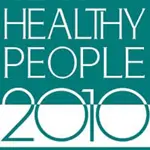
2001
Fenway launches The Fenway Institute, a national interdisciplinary center dedicated to ensuring cultural competence in health care for the GLBT community through research and evaluation, training and education, and policy and advocacy. Dr. Ken Mayer and Dr. Judith Bradford named co-chairs of The Fenway Institute.
Operating Budget:
Patient Visit Total:
HIV Patient Total:
Number of Paid Staff:
Total number of full-time medical providers:
2002
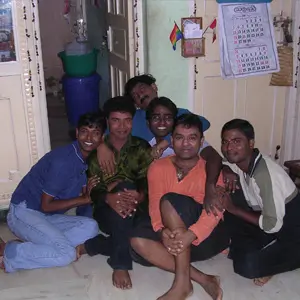
2003
The Fenway Men’s Event draws a record 1,500 attendees and sold out for the first time. More than $250,000 was raised to help support Fenway’s programs and services.
2004
Fenway opens an onsite pharmacy that offers prescription medications to Fenway patients.
In response to legalization of same-sex marriages in Massachusetts, Fenway begins offering same-sex marriage clinics. More than 1,000 patients came to Fenway for pre-marital screening appointments.
Fenway launches the Transgender Health Program to help provide health care to this often underserved population.
Operating Budget:
Patient Visit Total:
HIV Patient Total:
Number of Paid Staff:
2005
The Fenway Institute completes Phase I of its rectal microbicide acceptability study for men. The study hopes to provide information on developing additional methods to reduce HIV transmissions.
Fenway becomes one of the first organizations nationwide to participate in an experimental preventive vaccine trial for Human Papilloma Virus for men.
In an effort to help medical providers better understand the unique health care needs of gay and bisexual men, Fenway publishes “Preventing and Managing STDs in MSM: A Toolkit for Clinicians,” in cooperation with the Massachusetts Department of Public Health STD Division.
2006
Fenway Community Health breaks ground in Boston’s West Fen’s neighborhood for its future home. The 10-story, 100,000 square foot facility will be the largest LGBTQIA+ health care, education and research facility in the nation when complete in 2009.

2007
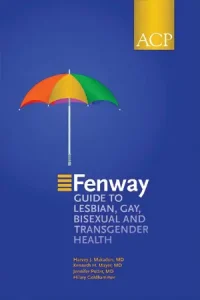
The Fenway Institute works with the American College of Physicians to publish The Fenway Guide to LGBT Health, the first American medical textbook to address the specific healthcare needs of LGBT people.
The Fenway Institute is the first community-based organization to be funded by the National Institutes of Health as a Population Research Center on LGBT Health. This represents an acknowledgment by the federal government of LGBT people as a unique population with specific health risks and disparities.
2008
Fenway’s South End practice moves to expanded space on the second floor of The Pledge of Allegiance Building at 142 Berkeley Street and adds women’s health providers, Behavioral Health services and a Pharmacy.
Fenway expands its Women’s Health department in anticipation of the upcoming move to 1340 Boylston Street.
2009
Fenway shortens its operating name to “Fenway Health” and debuts a new logo.

On March 30, the doors open on Fenway’s new 1340 Boylston Street home. The 10 story, 100,000 square foot facility is the largest building ever constructed by an organization with a specific mission to serve the LGBT community. The new facility allows Fenway to expand its medical and behavioral health departments and pharmacy and to add family dentistry and eye care services. In addition, Fenway’s Women’s Health program is given dedicated space on the building’s third floor.
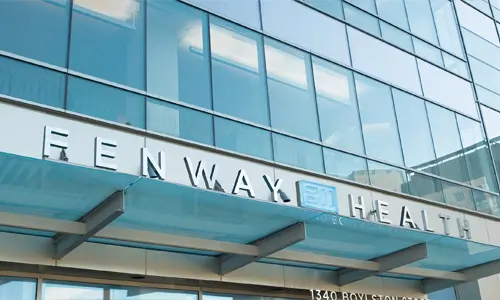
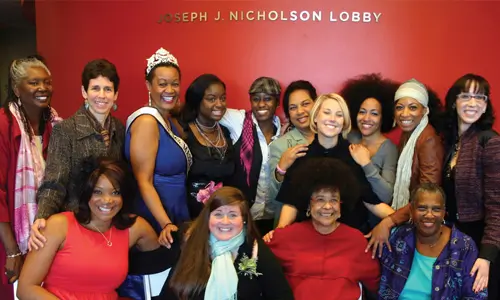
2010
The Sidney Borum, Jr. Health Program joins the Fenway Health family on July 1, 2010. The Borum operates as part of Fenway Health with the mission of serving marginalized and disenfranchised young people, including those who are LGBT (lesbian, gay, bisexual and transgender); homeless or living on the streets; struggling with substance use or abuse; sex workers; or living with HIV/AIDS.
In November, The New England Journal of Medicine (NEJM) publishes the results of the iPrex study which shows that pre-exposure use of HIV medications helps protect gay and bisexual men and transgender women from HIV infection. The Fenway Institute, under the leadership of Dr. Ken Mayer, is one of only two United States study sites and Dr. Mayer is one of the authors of the NEJM article on the study. The study involved 2,499 people in 6 countries on four continents and the study findings were some of the most exciting news in the battle against HIV in many years, receiving widespread coverage in the world press.
2011
Fenway reopens former 16 Haviland Street space as Fenway: Sixteen, the new home of Fenway’s HIV Counseling, Testing & Referrals Program, Health Navigation Services, Helplines, and gay and bisexual men’s health programs.
Fenway celebrates 40 years of service to the community
Operating Budget:
Patient Visit Total:
HIV Patient Total:
Number of Paid Staff:
2012
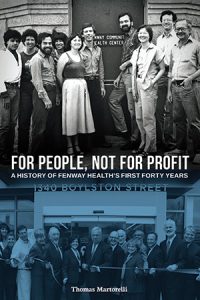
For People, Not For Profit: A History of Fenway Health’s First Forty Years, written by former Board Chair, Tom Martorelli, published.
2013
The LGBT Aging Project becomes part of The Fenway Institute.

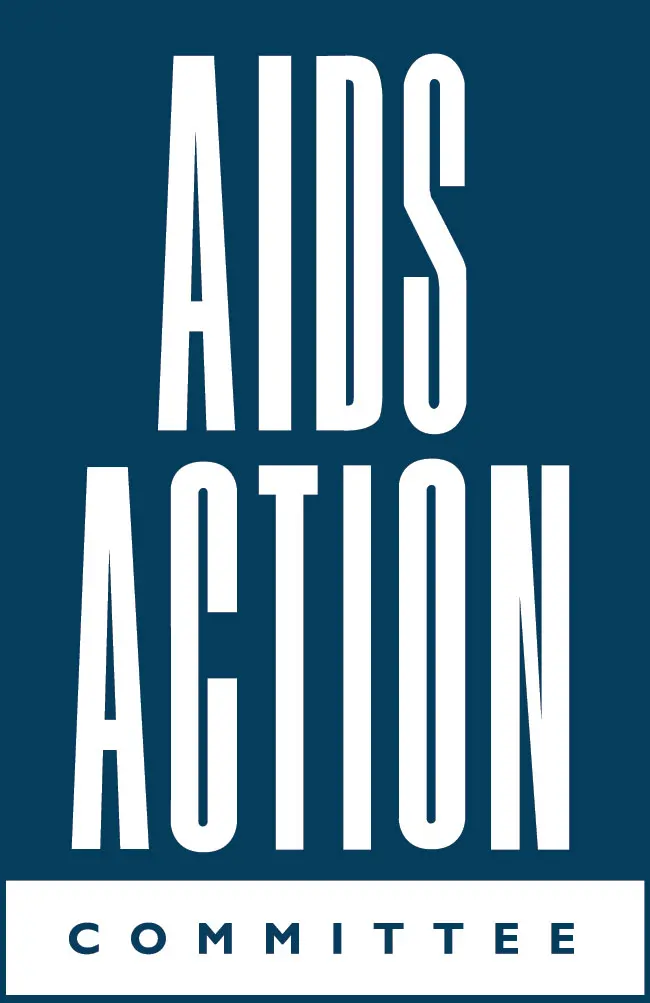
AIDS Action Committee of Massachusetts becomes part of the Fenway family once again, allowing the two organizations to work more closely together, improving delivery of care and services to people living with HIV/AIDS, and strengthening advocacy, prevention and research efforts.
Operating Budget:
Patient Visit Total:
HIV Patient Total:
Number of Paid Staff:
2014
Fenway offers Obstetrics as a natural extension of the AI Program – the first in the nation to serve lesbians and single women – and housed within the award-winning Women’s Health Program.
Carl Sciortino, former Massachusetts State Representative, becomes Executive Director of AIDS Action Committee after the successful tenure of Rebecca Haag. Sciortino is the first person living with HIV to lead AAC since its founding in 1982.
The US Centers for Disease Control and Prevention issue recommendations on the use of pre-exposure prophylaxis (PrEP) for preventing HIV infection. Fenway Health is strongly supportive of the use of PrEP, and biomedical research at The Fenway Institute was instrumental in gaining approval of this crucial new tool in the fight against HIV.
The Center for Population Research in LGBT Health, a program of The Fenway Institute led by Judith Bradford, PhD, hosts the first meeting of the groundbreaking Bisexual Research Collaborative on Health. National experts and activists in bisexual health research and advocacy convene at Fenway’s Ansin Building to set an agenda for cutting-edge collaboration in this understudied field.
The Fenway Institute partners with AIDS United and AIDS Resource Center of Wisconsin to launch the country’s first National Center for Innovation in HIV Care. Funded by the US Department of Health and Human Services, the three partners will travel the country to share best practices for HIV care and prevention with community health centers, AIDS service organizations and other community-based organizations.
The Fenway Institute is awarded $813,000 in funding to study the sexual health of female-to-male (FTM) transgender people. Sari Reisner, ScD, leads the pioneering project focusing on innovations in preventive sexual health screening in sexually-active FTM transgender patients.
Patient Visit Total:
HIV Patient Total:
Number of Paid Staff:
2015
The Fenway Institute publishes results from the Project VOICE survey of transgender Massachusetts residents, showing that nearly two-thirds had experienced discrimination in public accommodations, including restaurants, public transportation and health care settings.
Fenway’s Alternative Insemination Program sees the birth of its 500th baby.
Fenway’s Ansin Building practice at 1340 Boylston Street is named a Level 3 Patient-Centered Medical Home by the National Committee for Quality Assurance.
The second edition of The Fenway Guide to Lesbian, Gay, Bisexual and Transgender Health is published in conjunction with the American College of Physicians.
Nearly $500,000 in free and discounted medication is given out by the Fenway Pharmacy’s two branches to help meet the needs of low-income Fenway patients.
The Fenway Institute publishes Our Health Matters: Mental Health, Risk and Resilience Among LGBTQ Youth of Color Who Live, Work or Play in Boston. The report draws important attention to the higher risks of victimization, suicidality, substance abuse, homelessness and HIV infection faced by these young people.
Fenway’s National LGBT Health Education Center holds a first-of-its kind medical conference focused on transgender health. That same year, more than 2,300 transgender patients receive care at Fenway Health.
2016
Fenway adds Family Medicine and provides services to patients of every age group.
The LGBT Aging Project works closely with the state’s Special Legislative Commission on Lesbian, Gay, Bisexual and Transgender Aging to publish a report recommending large-scale reforms that will improve the lives of Massachusetts’ LGBT elder adults.
The Fenway Institute publishes a policy brief outlining the impact of anti-LGBT bills and laws on the health of LGBT people.
The Massachusetts Health Policy Commission names Fenway: South End the first practice in the state to achieve Patient-Centered Medical Home PRIME Certification for integrating behavioral health in primary medical care.
Operating Budget:
Patient Visit Total:
HIV Patient Total:
Number of Paid Staff:
2017
1340 Boylston Street achieves Patient-Centered Medical Home (PCMH) PRIME Certification status, joining Fenway South End as some of the first practices in the state to earn this distinction.
Jennifer Potter, MD, named Co-Chair of The Fenway Institute, alongside Kenneth Mayer, MD.
The projected operating budget for Fenway Health surpasses $100 million for the first time.
Fenway’s inaugural ERG launches – The Racial Justice and Equity Collaborative founding members include: Tfawa Haynes, Dwayne Steward, R. Mason, Amy Santana, Mike Yepes, Rhashida Adams, and Asia Brice, with executive mentorship and sponsorship from Michelle Bordeu and Alex Gonzalez.
2020
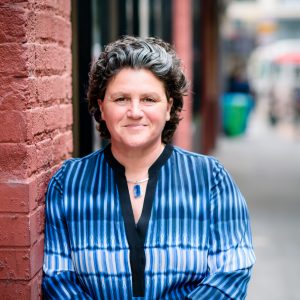
Fenway welcomes Ellen LaPointe as our new CEO.
As the COVID-19 Pandemic rolled across the globe, Fenway Health pivoted to respond, moving the majority of our medical and behavioral health appointments to telehealth, standing up testing programs in Boston and Everett, and activating several research studies, including COVID-19 vaccine trials.
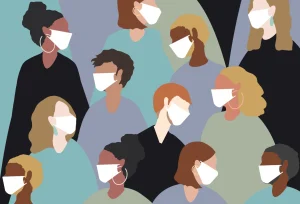
The Dinner Party and Men’s Event 2020 were held together, for the first time, as one virtual gala due to the COVID-19 pandemic. Moving our signature events online allowed us to celebrate our LGBTQIA+ community safely.
29th Dinner Party &
27th Men’s Event
Date: 6/24/2020
Location: Virtual Event
Co-Chairs: Mary Beth McInerney, Dr. Jennifer Petter,
Ali Robinson, Taylor Brown,
Thomas Evans, and Taylor S. Harris
Awardees: Dr. Susan M. Love Award presented to
Rev. Irene Monroe and Dr. Thea James;
Fenway Health LGBTQIA+ Impact Award
presented to the FLAG Flag Football League.
2021
Fenway’s COVID-19 vaccination program opened early in 2021.
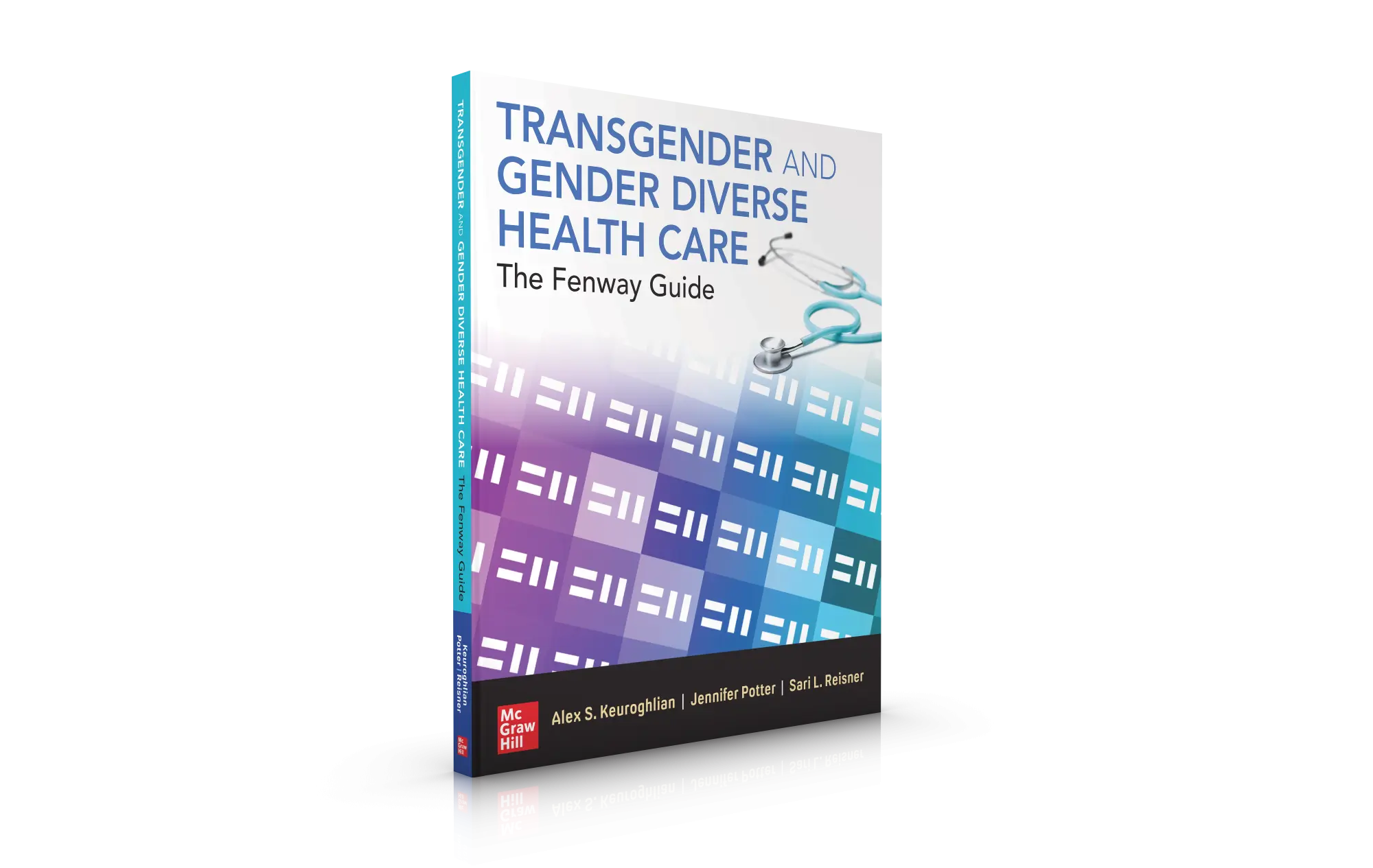
Fenway Health Clinicians And Researchers The First Edition Of Transgender And Gender Diverse Health Care: The Fenway Guide published. Authored by Fenway Health Clinicians And Researchers, it is the first case-based textbook to address the comprehensive health care needs of transgender and gender diverse adults.
Operating Budget:
Patient Visit Total:
Number of Paid Staff:
Transgender Patient Total:
2022
The 1st Annual Fenway Health Gala
Date: May 24, 2022
Location: Fenway Park
Co-Chairs: Mary Beth McInerney and Taylor Brown
Award Recipient: Boston Black COVID Coalition
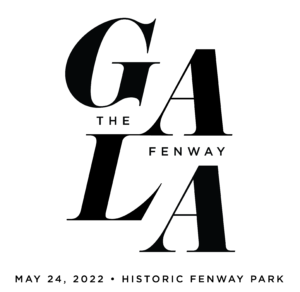
2022

In 2022, Fenway Health went live with Epic and MyChart, a best-in-class, secure patient-centered electronic health records platform.
2023
On October 1, 2023, 37 years after the first “All Walks of Life”, AIDS Walk Boston relaunches as “Strides for Action”. Strides for Action places additional emphasis on the unique healthcare challenges and needs across the LGBTQIA+ community while continuing raise funds and awareness for its original mission. In addition to HIV/AIDS prevention and research, Strides for Action centers gender-affirming
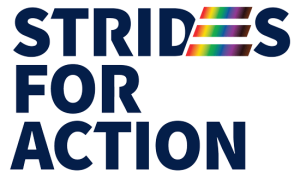
2024
Come Out with Fenway Health as we embark on a historic next chapter of community healthcare and research. In partnership with our patients and the communities we serve, we are thrilled to invite you to join us for a fabulous evening of food, fun, and entertainment as we lay out a shared vision for the future of LGBTQIA+ healthcare.




